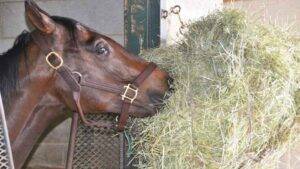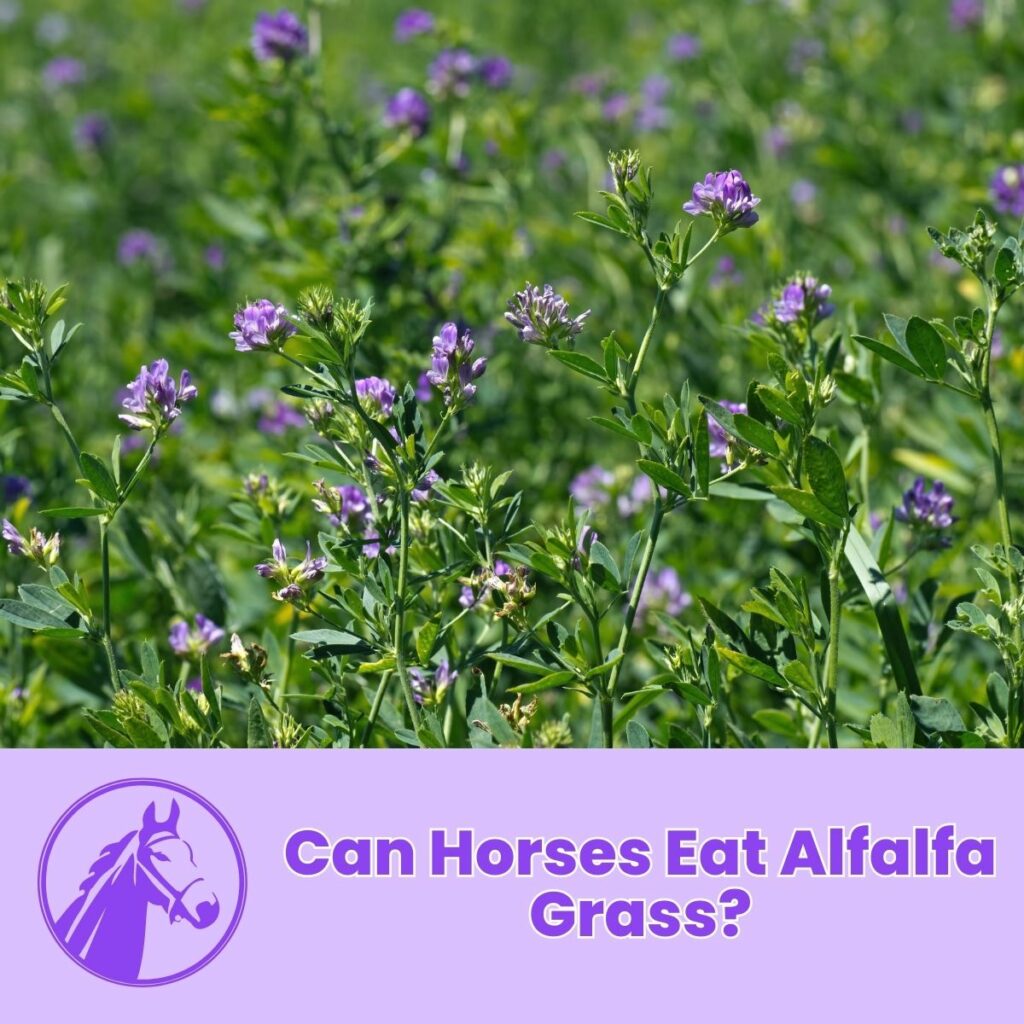As an Amazon Associate we earn from qualifying purchases.
Alfalfa grass is a nutritious and delicious snack that is loved by many horses. But as a horse owner, it’s important to know which foods are safe and beneficial for your horse to eat. In this article, we will explore the question “Can horses eat alfalfa grass?” We will discuss the potential benefits as well as safety concerns of feeding alfalfa to horses. We’ll also look at the best way to serve alfalfa so that your horse can enjoy the tastiest (and safest) meal possible.
So Can Horses Eat Alfalfa Grass?
Yes, horses can eat alfalfa grass. Alfalfa is a nutrient-rich grass that can provide essential vitamins and minerals to horses. Additionally, alfalfa provides roughage, which is important for equine digestion. While there are some potential risks associated with alfalfa, such as bloat or digestive upset, these risks can be minimized by monitoring the amount of alfalfa consumed and supplementing with other forms of forage. When fed in moderation and in combination with other forms of forage, alfalfa can be a safe and beneficial food source for horses.
SEE ALSO : Do Alfalfa Cubes Go Bad & How Long Do Alfalfa Cubes Last?
What is Alfalfa Grass?

Alfalfa is a high-protein, high-fiber legume that is considered to be one of the most nutritious plants for human and animal consumption. It is the third most widely used food crop in the world, behind wheat and rice.
Alfalfa is an excellent source of many minerals and vitamins, particularly vitamins A, D, E, and K. It is especially beneficial for horses, as it contains essential amino acids, is high in sugar, and is easily digested. It has been used by horses for centuries as a good source of nourishment. For humans, alfalfa offers a wide range of health benefits, from aiding in digestion and lowering cholesterol to helping the body detox and boost the immune system.
Its deep green color is a result of the abundance of chlorophyll in the plant, which helps protect our cells from damage.
SEE ALSO : Can Horses Have Honey?
Nutritional Content of Alfalfa Grass
Alfalfa grass provides many important vitamins and minerals that are necessary for the health of horses. It is rich in Vitamin A, B, C, and K, as well as essential minerals such as calcium, phosphorus, potassium, magnesium, sodium, iron, sulphur, zinc, and copper. It also contains lysine, threonine, tryptophan, and other essential amino acids. The combination of these nutrients, along with the high protein content, makes Alfalfa an important component in maintaining the health of horses.
The combination of high protein, calcium, magnesium, and many other essential vitamins and minerals make alfalfa grass a highly nutritious forage for horses. High magensium content, for instance, helps to keep the horse’s electrolyte balance in check, while calcium and phosphorus help to maintain strong bones and teeth. In addition, Alfalfa is highly digestible, allowing horses to easily absorb and utilize most of the nutrients they consume.
Alfalfa grass can also help reduce the risk of colic in horses, as it has prebiotic compounds which help promote healthy digestion and nutrient absorption in the horse. Furthermore, the high content of carotene and antioxidants act as a natural anti-inflammatory, helping to reduce inflammation, support joint health, and promote overall health and wellbeing.
Finally, Alfalfa helps to reduce the horse’s risk of developing neurological disorders such as laminitis and equine metabolic syndrome, as it has a low sugar and starch content. Overall, Alfalfa offers numerous benefits for the health of horses and should be an important part of their diet.
Feeding Guidelines
When feeding alfalfa to horses, it is important to follow some basic guidelines. The amount you feed should be limited to no more than one to two pounds per day, depending on the size of the horse. Additionally, it is best to offer a variety of feeds to ensure your horse is getting all of the necessary nutrients. You should also monitor your horse’s body condition and adjust the feeding schedule accordingly.
Potential Risks of Alfalfa
While alfalfa can be beneficial to horses, there are some potential risks associated with feeding it. First, it should never be fed to young horses or those with developmental issues. Additionally, it should not be given to horses with a history of founder or laminitis, as it’s high sugar content can be damaging to their hooves.
Can Horses Eat Alfalfa Grass – Final Thoughts
Alfalfa is a type of legume that can offer a horse high levels of key nutrients such as protein, vitamins, and minerals. It has more nutritional value than hay or grass, making it the ideal forage for horses. Feeding alfalfa should be done in moderation and with caution as some potential risks are associated with overfeeding. When fed correctly, it can be a valuable part of a balanced horse diet. So the answer to can horses eat alfalfa grass is a definite yes.
Amazon and the Amazon logo are trademarks of Amazon.com, Inc, or its affiliates.

Hey there, I’m Jasmine! I’m a total horse fanatic and have been working with these amazing animals for as long as I can remember. I’m passionate about sharing my love for horses with others and helping them learn more about these majestic creatures. As a professional horse trainer and riding instructor, I’ve developed a deep understanding of equine science and am committed to the welfare of horses. That’s why I founded OwnTheHorse.com, a blog where I share my knowledge and insights with fellow horse enthusiasts. I love connecting with my readers and building a friendly community of horse lovers. Whether you’re a seasoned equestrian or just starting out, I’m here to help and inspire you. Above all, I’m a friendly and compassionate person who truly cares about the well-being of horses and their human companions.

